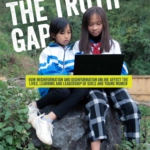Media Centre - 11 October 2021
OPINION: Misinformation on social media has damaging impacts
Social media and communications technology are wonderful tools which allow us to connect with people living anywhere in the world instantaneously, and can keep us updated with global news and events.
However, this access to information is not as benign as once thought.
According to The Truth Gap, a global report and survey of 26,000 girls in 26 countries carried out by Plan International and released this week, misinformation online is damaging the lives of young people in profound ways.
Of the 1001 young Australian women who participated, 95 per cent were concerned about misinformation and/or disinformation online. More than half regularly engage with COVID information online, with one in four questioning whether to get vaccinated based on misinformation they had read on the internet. But the damaging impacts of misinformation goes much further than just COVID.
When we go online, particularly social media platforms, the content that appears on our feed often directly relates to our interests – and this is not a coincidence.
The platforms we use receive data about us – ranging from our casual interests and hobbies to our political alignment. This is not inherently bad – we all want to be seeing content that interests us. However this information can easily be misused to manipulate users and polarize society. T
he cherry-picking of content that aligns with an individual’s interest leads to the creation of echo-chambers, which is an online environment where individuals receive opinions and content that reflect their own ideas.
Echo chambers can inhibit discussions about controversial topics such as climate change and racial justice, with participants only receiving information that aligns with or confirms their bias.
Discussions about COVID have been notorious for misinformation, with dangerous implications ranging from creating hesitancy around vaccinations to questioning whether the virus exists. These days, it seems you’re either pro-vaccine or anti-vaccine on social media.
But the onus to distinguish true from false information online should not fall entirely on young people. Social media companies need to reconsider their algorithms to create less harmful impacts. Additionally, Australia needs to increase and promote digital literacy from as early as primary school age so young people possess the skills to navigate an increasingly online society. Australia must act now to protect its citizens from becoming increasingly divided and misinformed.
Jazmin Wright, Plan International Australia’s Youth Activist Series member
Media contacts


